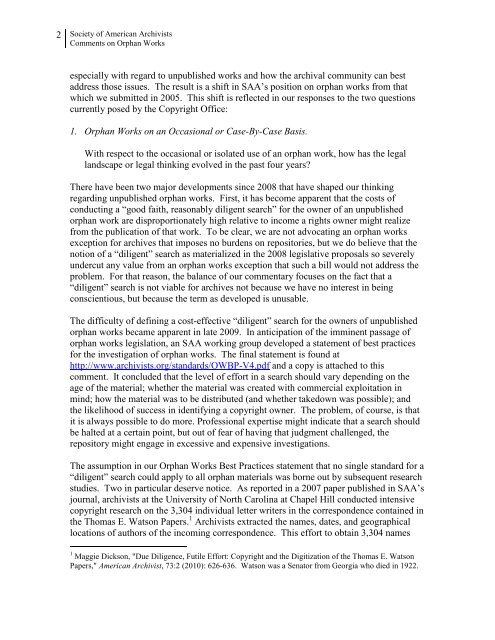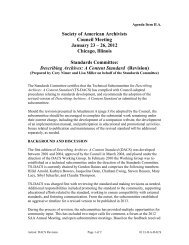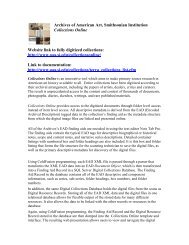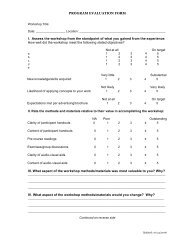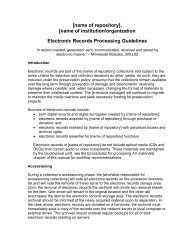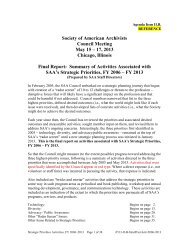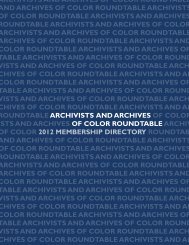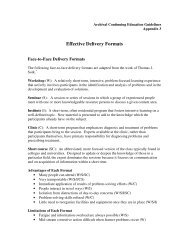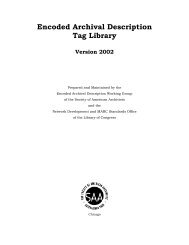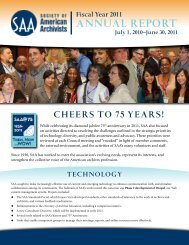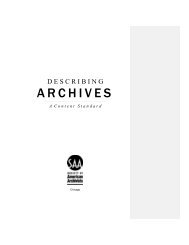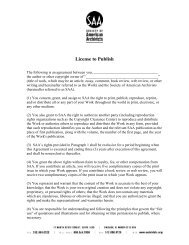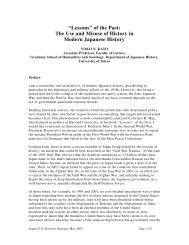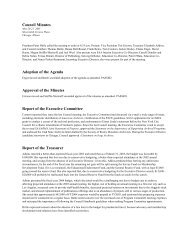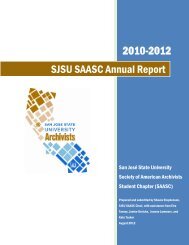Society of American Archivists - US Copyright Office
Society of American Archivists - US Copyright Office
Society of American Archivists - US Copyright Office
You also want an ePaper? Increase the reach of your titles
YUMPU automatically turns print PDFs into web optimized ePapers that Google loves.
2 <strong>Society</strong> <strong>of</strong> <strong>American</strong> <strong>Archivists</strong>Comments on Orphan Worksespecially with regard to unpublished works and how the archival community can bestaddress those issues. The result is a shift in SAA’s position on orphan works from thatwhich we submitted in 2005. This shift is reflected in our responses to the two questionscurrently posed by the <strong>Copyright</strong> <strong>Office</strong>:1. Orphan Works on an Occasional or Case-By-Case Basis.With respect to the occasional or isolated use <strong>of</strong> an orphan work, how has the legallandscape or legal thinking evolved in the past four years?There have been two major developments since 2008 that have shaped our thinkingregarding unpublished orphan works. First, it has become apparent that the costs <strong>of</strong>conducting a “good faith, reasonably diligent search” for the owner <strong>of</strong> an unpublishedorphan work are disproportionately high relative to income a rights owner might realizefrom the publication <strong>of</strong> that work. To be clear, we are not advocating an orphan worksexception for archives that imposes no burdens on repositories, but we do believe that thenotion <strong>of</strong> a “diligent” search as materialized in the 2008 legislative proposals so severelyundercut any value from an orphan works exception that such a bill would not address theproblem. For that reason, the balance <strong>of</strong> our commentary focuses on the fact that a“diligent” search is not viable for archives not because we have no interest in beingconscientious, but because the term as developed is unusable.The difficulty <strong>of</strong> defining a cost-effective “diligent” search for the owners <strong>of</strong> unpublishedorphan works became apparent in late 2009. In anticipation <strong>of</strong> the imminent passage <strong>of</strong>orphan works legislation, an SAA working group developed a statement <strong>of</strong> best practicesfor the investigation <strong>of</strong> orphan works. The final statement is found athttp://www.archivists.org/standards/OWBP-V4.pdf and a copy is attached to thiscomment. It concluded that the level <strong>of</strong> effort in a search should vary depending on theage <strong>of</strong> the material; whether the material was created with commercial exploitation inmind; how the material was to be distributed (and whether takedown was possible); andthe likelihood <strong>of</strong> success in identifying a copyright owner. The problem, <strong>of</strong> course, is thatit is always possible to do more. Pr<strong>of</strong>essional expertise might indicate that a search shouldbe halted at a certain point, but out <strong>of</strong> fear <strong>of</strong> having that judgment challenged, therepository might engage in excessive and expensive investigations.The assumption in our Orphan Works Best Practices statement that no single standard for a“diligent” search could apply to all orphan materials was borne out by subsequent researchstudies. Two in particular deserve notice. As reported in a 2007 paper published in SAA’sjournal, archivists at the University <strong>of</strong> North Carolina at Chapel Hill conducted intensivecopyright research on the 3,304 individual letter writers in the correspondence contained inthe Thomas E. Watson Papers. 1 <strong>Archivists</strong> extracted the names, dates, and geographicallocations <strong>of</strong> authors <strong>of</strong> the incoming correspondence. This effort to obtain 3,304 names1 Maggie Dickson, "Due Diligence, Futile Effort: <strong>Copyright</strong> and the Digitization <strong>of</strong> the Thomas E. WatsonPapers," <strong>American</strong> Archivist, 73:2 (2010): 626-636. Watson was a Senator from Georgia who died in 1922.


